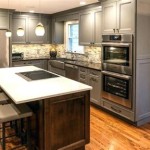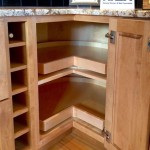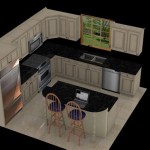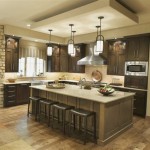Cost of Kitchen Countertops Installed: A Comprehensive Guide
Kitchen countertops are a pivotal element in both the functionality and aesthetics of a kitchen. They provide a workspace for food preparation, a surface for appliances, and contribute significantly to the overall design of the room. When planning a kitchen renovation or new construction, understanding the cost of countertops, including installation, is crucial for budgeting and making informed decisions. The price of kitchen countertops varies significantly based on a multitude of factors, spanning from the material chosen to the complexity of the installation process. This article offers an in-depth exploration into the various aspects influencing the cost of kitchen countertops installed.
The national average cost for installed kitchen countertops can range from approximately $2,000 to $10,000, but this is a broad estimate. Some high-end materials, extensive countertop areas, or intricate designs can push the cost beyond this range. It's essential to obtain detailed quotes from multiple contractors to get a more accurate understanding of the specific costs involved for your project.
The overall cost is typically broken down into two primary categories: the cost of the countertop material itself and the cost of labor for installation. Each of these categories is influenced by numerous factors which will be explored in the following sections.
Material Selection and its Impact on Cost
The type of material selected for your kitchen countertop will have the most significant impact on the overall cost. Countertop materials range from budget-friendly laminates to high-end natural stones, each with its own set of characteristics, advantages, and disadvantages. Here’s a breakdown of some common countertop materials and their typical price ranges:
Laminate: Laminate countertops are the most affordable option, typically ranging from $20 to $50 per square foot installed. They consist of a thin layer of plastic laminate bonded to a particleboard or MDF core. Laminate is available in a vast array of colors and patterns, including those mimicking natural stone. While relatively inexpensive, laminate is susceptible to scratches, stains, and heat damage and generally has a shorter lifespan than other countertop materials.
Tile: Tile countertops, often made of ceramic or porcelain, typically cost between $25 and $80 per square foot installed. Tile offers a wide range of design possibilities due to the variety of colors, sizes, and patterns available. However, tile countertops have grout lines, which can be difficult to clean and may stain over time. Additionally, tile can chip or crack under heavy impact.
Butcher Block: Butcher block countertops, made from strips of hardwood glued together, generally range from $35 to $100 per square foot installed. Butcher block provides a warm and natural aesthetic and is a good surface for food preparation, requiring regular oiling to maintain its condition and prevent cracking. It is susceptible to scratches and water damage if not properly sealed and maintained.
Solid Surface: Solid surface countertops, such as Corian, typically cost between $40 and $120 per square foot installed. Solid surface materials are made from a blend of acrylic particles and resins, creating a non-porous surface that is resistant to stains and bacteria. Solid surface countertops can be seamed seamlessly and are available in a variety of colors and patterns. While more durable than laminate, they can still be scratched or damaged by heat.
Quartz: Quartz countertops, engineered from crushed quartz and resins, generally range from $50 to $150 per square foot installed. Quartz is a popular choice due to its durability, stain resistance, and low maintenance requirements. It is available in a wide range of colors and patterns, often mimicking the look of natural stone. Quartz is less porous than natural stone and does not require sealing.
Granite: Granite countertops, a natural stone, typically cost between $60 and $200 per square foot installed. Granite is known for its durability, heat resistance, and unique appearance. Each slab of granite is different, offering a one-of-a-kind look. Granite requires sealing to prevent stains and is susceptible to chipping if struck with a hard object.
Marble: Marble countertops, another natural stone, typically cost between $75 and $250 per square foot installed. Marble is prized for its luxurious appearance and veining patterns. However, marble is a soft and porous stone, making it susceptible to scratches, stains, and etching from acidic substances. It requires regular sealing and careful maintenance to preserve its beauty.
Concrete: Concrete countertops, typically custom-made, generally range from $75 to $200 per square foot installed. Concrete can be tinted and shaped to create a unique and modern look. However, concrete is porous and requires sealing to prevent staining. It can also be prone to cracking and may require specialized installation.
Soapstone: Soapstone countertops, a natural stone, typically cost between $70 and $150 per square foot installed. Soapstone is known for its soft, smooth texture and natural gray color, which darkens over time. It is resistant to stains and heat, but it is relatively soft and can scratch easily. However, scratches can be easily sanded out and the surface oiled to even out the color.
Installation Labor Costs and Contributing Factors
The labor cost for installing kitchen countertops can vary significantly based on several factors. These factors include the complexity of the installation, the size and layout of the kitchen, the material being installed, and the geographic location. Generally, labor costs range from $10 to $50 per square foot, but this can be higher for more complex projects or high-end materials.
Complexity of the Installation: A straightforward countertop replacement in a simple rectangular kitchen will typically have lower labor costs than a more complex installation involving custom shapes, islands, or intricate edge details. The need for precise measurements, cutting on-site, or specialized tools can all increase labor costs.
Size and Layout of the Kitchen: Larger kitchens with more countertop space will naturally require more labor to install. The layout of the kitchen, including the presence of obstacles such as pipes, wires, or uneven walls, can also increase the time and effort required for installation.
Material Being Installed: Some countertop materials are more challenging to install than others. For example, installing heavy natural stone countertops like granite or marble requires specialized equipment and expertise, which can increase labor costs. Similarly, materials like concrete may require on-site fabrication, adding to the labor time.
Geographic Location: Labor costs can vary significantly depending on the geographic location. Areas with a higher cost of living typically have higher labor rates for contractors and installers. The availability of skilled labor in the area can also influence the cost.
Demolition and Removal of Existing Countertops: The removal and disposal of existing countertops can add to the overall labor costs. Some contractors may charge a separate fee for this service, while others may include it in the overall installation cost. The complexity of removing the old countertops can also affect the cost; for example, if the existing countertops are heavily glued or damaged, removal may take longer and require more effort.
Plumbing and Electrical Work: If the countertop installation involves changes to plumbing or electrical fixtures, such as sinks, faucets, or outlets, this will add to the overall cost. Licensed plumbers and electricians are typically required to perform these tasks, and their services will be billed separately or included in the overall project cost.
Seam Placement and Fabrication: The number of seams required in the countertop installation can affect the labor cost, particularly for materials like natural stone. Skilled fabricators are needed to create seamless or near-seamless seams, and this requires specialized tools and expertise. The complexity of the edge fabrication can also impact the cost; more elaborate edge details, such as ogee or bullnose edges, require additional time and effort to create.
Additional Cost Considerations
Beyond the material and installation costs, there are several additional considerations that can impact the overall price of kitchen countertops. These include:
Edge Detailing: The edge profile of the countertop can significantly affect the overall cost. Simple, straight edges are typically the least expensive, while more intricate edges like ogee, bullnose, or waterfall edges can add significantly to the cost. The complexity of the edge detail requires additional fabrication time and specialized equipment.
Sink and Appliance Cutouts: Cutting holes for sinks, faucets, cooktops, and other appliances requires precision and can add to the overall cost. The size and shape of the cutouts, as well as the type of material being cut, can affect the labor time and cost. For example, cutting into hard materials like granite or quartz requires specialized diamond-tipped blades and skilled technicians.
Backsplash Installation: If a backsplash is being installed along with the new countertops, this will add to the overall cost. The material chosen for the backsplash, as well as the complexity of the installation, will affect the price. Backsplashes can range from simple tile installations to elaborate mosaics or custom-fabricated materials.
Sealing and Maintenance Products: Some countertop materials, particularly natural stones like granite and marble, require sealing to protect them from stains and water damage. The cost of sealing products and ongoing maintenance should be factored into the overall budget. Professional sealing services can also be hired, which will add to the cost.
Structural Support: For countertops with unsupported overhangs, such as breakfast bars or islands, additional structural support may be required. This can involve installing brackets, corbels, or other support structures to ensure the countertop is stable and safe. The cost of these support structures and their installation should be considered.
Permits: In some areas, a building permit may be required for countertop installation, particularly if it involves structural changes or plumbing/electrical work. The cost of obtaining the necessary permits should be factored into the overall budget.
Unexpected Issues: During the demolition and installation process, unexpected issues may arise, such as damaged subfloors or hidden plumbing problems. These issues can add to the overall cost of the project and should be accounted for in the budget.
Careful planning and budgeting are essential when considering the cost of kitchen countertops installed. By understanding the various factors that influence the price, homeowners can make informed decisions and ensure their kitchen renovation stays within budget.

Cost To Install Kitchen Countertops Countertop Replacement Fixr

Cost To Install A Countertop The Home

Cost To Install Kitchen Countertops Countertop Replacement Fixr

How Much Do Quartz Countertops Cost To Install In Denver

Cost To Install A Countertop The Home

How Much Do Quartz Countertops Cost 2024

Cost To Install Kitchen Countertops Countertop Replacement Fixr

Cost To Install A Countertop The Home

Countertop Installation Often Includes Hidden Costs Orange County Register

How Much Does It Cost To Install A Kitchen Countertop Sd Granite








